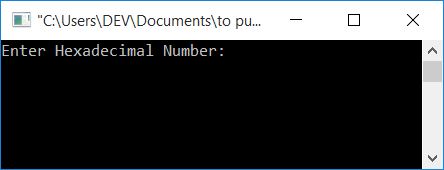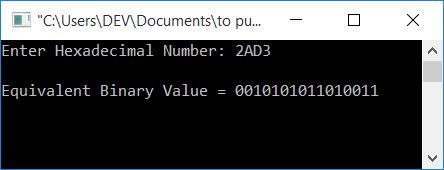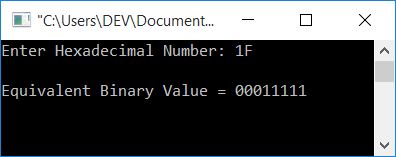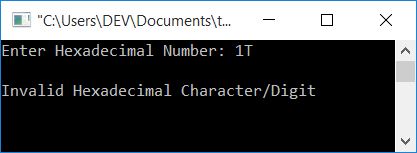- C Programming Examples
- C Programming Examples
- C Print Hello World
- C Get Input from User
- C Print Integer
- C Add Two Numbers
- C Add Subtract Multiply Divide
- C Add n Numbers
- C Area Perimeter of Square
- C Area Perimeter of Rectangle
- C Area Circum of Circle
- C Fahrenheit to Celsius
- C Celsius to Fahrenheit
- C Inches to Centimeters
- C Kilogram to Gram
- C Reverse a Number
- C Swap Two Numbers
- C Interchange Numbers
- C Print ASCII Value
- C Print Fibonacci Series
- C Check Palindrome or Not
- C Check Armstrong or Not
- C Find Armstrong Numbers
- C Find nCr and nPr
- C Find Profit Loss
- C Sum of their Square
- C First & Last Digit Sum
- C Sum of All Digit
- C Product of All Digit
- C Print Total Digit in Number
- C Check Perfect Number
- C Find Basic Gross Salary
- C Round Number to Integer
- C Print Series upto n Term
- C Find Factors of Number
- C if-else & Loop Programs
- C Check Even or Odd
- C Check Prime or Not
- C Check Alphabet or Not
- C Check Vowel or Not
- C Check Leap Year or Not
- C Is Reverse Equal Original
- C Make Calculator
- C Add Digits of Number
- Count Positive Negative Zero
- C Largest of Two Numbers
- C Largest of Three Numbers
- C Smallest of Two Numbers
- C Smallest of Three Numbers
- C Find Factorial of Number
- C Find LCM & HCF
- C Find LCM of n Numbers
- C Find HCF of n Numbers
- C Find Arithmetic Mean
- C Find Average, Percentage
- C Find Student Grade
- C Print Table of Number
- C Print Prime Numbers
- C Find Discount Purchase
- C Calculate Parcel Charge
- C Calculate Wage of Labor
- C Print Phone Bill
- C Conversion programs
- C Decimal to Binary
- C Decimal to Octal
- C Decimal to Hexadecimal
- C Binary to Decimal
- C Binary to Octal
- C Binary to Hexadecimal
- C Octal to Decimal
- C Octal to Binary
- C Octal to Hexadecimal
- C Hexadecimal to Decimal
- C Hexadecimal to Binary
- C Hexadecimal to Octal
- C Pattern Programs
- C Pattern Printing Programs
- C Print Diamond Pattern
- C Print Floyd's Triangle
- C Print Pascal's Triangle
- C Array Programs
- C 1D Array Programs
- C Linear Search
- C Binary Search
- C Largest Element in Array
- C Smallest Element in Array
- C Second Largest/Smallest
- C Count Even Odd
- C Array Element at Even
- C Array Element at Odd
- C Print Even Array Elements
- C Print Odd Array Elements
- C Sum/Product of Even/Odd
- C Reverse an Array
- C Insert Element in Array
- C Delete Element from Array
- C Merge Two Arrays
- C Bubble Sort
- C Selection Sort
- C Insertion Sort
- C Print Common Elements
- C 2D Array Programs
- C Add Two Matrices
- C Subtract Two Matrices
- C Transpose a Matrix
- C Multiply Two Matrices
- C Sum All Matrix Elements
- C Largest Element in Matrix
- C Print Row Column Total
- C 3D Array Programs
- C String Programs
- C Print String
- C Find Length of String
- C Compare Two String
- C Copy a String
- C Concatenate String
- C Reverse a String
- C Count Vowels Consonants
- C Replace Vowel in String
- C Delete Vowels from String
- C Delete Word from String
- C Frequency of Character
- C Count Word in String
- C Remove Spaces from String
- C Sort a String
- C Sort String in Alphabetical
- C Sort Words in Ascending
- C Sort Words in Descending
- C Uppercase to Lowercase
- C Lowercase to Uppercase
- C Swap Two Strings
- C Check Anagram or Not
- C Check Palindrome String
- C Print Number in Words
- C Print Successive Character
- C Character without Space
- C File Programs
- C Read a File
- C Write Content to File
- C Read & Display File
- C Copy a File
- C Merge Two Files
- C Reverse File
- C Count All Character in File
- C List Files in Directory
- C Encrypt & Decrypt a File
- C Delete a File
- C Misc Programs
- Generate Random Numbers
- C Print Date Time
- C Print Message with Time
- C Get IP Address
- C Print Smiling face
- C Pass Array to Function
- Add Two Numbers using Pointer
- C Address of Variable
- C Shutdown Computer
- C Programming Tutorial
- C Tutorial
C Program to Convert Hexadecimal to Binary
In this article, you will learn and get code for the conversion of a given number from hexadecimal to binary.
But before going through the program, if you are not aware of
- Hexadecimal Number
- Binary Number
- Hexadecimal to Binary Conversion Process
Then, refer to the step-by-step hexadecimal to binary conversion process. Now let's move on to the program given below.
Hexadecimal to Binary in C
To convert a hexadecimal number to a binary number in C programming, you have to ask the user to enter the hexadecimal number to convert it into its equivalent binary number, as shown in the program given below. The question is: write a program in C that takes any number (in the hexadecimal system) as input and converts it into its equivalent binary value. The answer to this question is:
#include<stdio.h> #include<conio.h> int main() { int i=0; char hexdec[11]; printf("Enter Hexadecimal Number: "); gets(hexdec); printf("\nEquivalent Binary Value = "); while(hexdec[i]) { switch(hexdec[i]) { case '0': printf("0000"); break; case '1': printf("0001"); break; case '2': printf("0010"); break; case '3': printf("0011"); break; case '4': printf("0100"); break; case '5': printf("0101"); break; case '6': printf("0110"); break; case '7': printf("0111"); break; case '8': printf("1000"); break; case '9': printf("1001"); break; case 'A': printf("1010"); break; case 'a': printf("1010"); break; case 'B': printf("1011"); break; case 'b': printf("1011"); break; case 'C': printf("1100"); break; case 'c': printf("1100"); break; case 'D': printf("1101"); break; case 'd': printf("1101"); break; case 'E': printf("1110"); break; case 'e': printf("1110"); break; case 'F': printf("1111"); break; case 'f': printf("1111"); break; default: printf("--Invalid Hex Digit (%c)--", hexdec[i]); } i++; } getch(); return 0; }
This program was compiled and executed in the Code::Blocks IDE. Here is the sample run. This is the initial snapshot of the sample run:

Now supply any value (in the hexadecimal number system), say 2AD3, and press the ENTER key to see the equivalent value in the binary number system as shown in the snapshot given below:

Program Explained
- declares a variable, say i, of the int type and initializes it with 0.
- Declares another char variable, say hexdec
- The maximum size of hexdec is defined as 11. That is, it can hold up to 10 characters. The last space is for a null-terminated character (\0).
- Now get the value of the hexadecimal number from the user (at run-time) using the gets() function.
- For example, suppose the user enters 2AD3 as a hexadecimal number. Then,
- 2 is saved at hexdec[0]
- A is saved at hexdec[1]
- D is saved at hexdec[2]
- 3 is saved at hexdec[3]
- So here we have created a while loop that runs until the last character of the given hexadecimal value.
- Inside the loop, we have used switch case to print the binary value for each and every hexadecimal character one by one.
Hexadecimal to Binary in C using the strcat() Function
Now let's create another program that uses the string function strcat() to concatenate the string. Let's have a look at the program given below:
#include<stdio.h> #include<conio.h> #include<string.h> int main() { int i=0, chk=0; char hexdec[11], binnum[40]=""; printf("Enter Hexadecimal Number: "); gets(hexdec); while(hexdec[i]) { switch(hexdec[i]) { case '0': strcat(binnum, "0000"); break; case '1': strcat(binnum, "0001"); break; case '2': strcat(binnum, "0010"); break; case '3': strcat(binnum, "0011"); break; case '4': strcat(binnum, "0100"); break; case '5': strcat(binnum, "0101"); break; case '6': strcat(binnum, "0110"); break; case '7': strcat(binnum, "0111"); break; case '8': strcat(binnum, "1000"); break; case '9': strcat(binnum, "1001"); break; case 'A': strcat(binnum, "1010"); break; case 'a': strcat(binnum, "1010"); break; case 'B': strcat(binnum, "1011"); break; case 'b': strcat(binnum, "1011"); break; case 'C': strcat(binnum, "1100"); break; case 'c': strcat(binnum, "1100"); break; case 'D': strcat(binnum, "1101"); break; case 'd': strcat(binnum, "1101"); break; case 'E': strcat(binnum, "1110"); break; case 'e': strcat(binnum, "1110"); break; case 'F': strcat(binnum, "1111"); break; case 'f': strcat(binnum, "1111"); break; default: chk = 1; break; } i++; } if(chk==0) printf("\nEquivalent Binary Value = %s", binnum); else printf("\nInvalid Hexadecimal Character/Digit"); getch(); return 0; }
Here is the first sample run when the user enters any valid hexadecimal number, say 1F. Then the output produced by the above program will look like this:

And here is another sample run, when the user enters any invalid hexadecimal digit, say 1T. Then the output produced by the above program will look like this:

Program Explained
- Here, the binary equivalent of each and every hex digit gets concatenated one by one.
- And at last, we have checked and printed the equivalent binary value of the given hexadecimal value.
- Here we have checked whether the value of chk contains its original value or not.
- If it contains its original value, which is 0, then the default statement of switch case never runs.
- It means that no invalid hexadecimal character was entered by the user.
- And if chk does not hold its original value after exiting the while loop, then it means the default statement gets executed at once.
- So an invalid hexadecimal character was entered by the user.
- As a result, the program prints "Invalid Hexadecimal Character or Digit" as output.
The same program in different languages
« Previous Program Next Program »